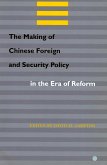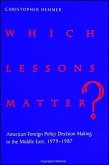'An original and insightful approach to the understanding of foreign policy. Applying cultural, historical and psychological perspectives grounded in classical and modern scholarship, Raymond Taras shows how suspicions, hatreds and fears of real and imagined enemies are major factors in foreign policies. In so doing, he provides a needed corrective to the assumptions of rational decision making.' William Safran, Professor Emeritus of Political Science, University of Colorado at Boulder Can a society's fear of foreigners engender xenophobic foreign policy? This is a book about conflicts and fears, about how countries in Europe are drawn into international events because of domestic reasons. The reasons why the US and UK militaries intervened in Iraq, Afghanistan and other conflict zones have inspired much research, but what explains France's new-found international activism taking its military to Libya and Mali and deeper into Africa? Why has Poland become deeply engaged in Ukraine's politics? How is it that Sweden - which has not fought a war since 1814 - has become concerned about fierce internal wars in Iraq and Syria? Are the national interests of these countries the only reasons, or could domestic xenophobia also be playing a part? In Fear and the Making of Foreign Policy, Raymond Taras explains the causal mechanisms propelling three EU states to become engaged in outside conflicts and tells the story of when and why xenophobia at home is converted into xenophobia abroad. Key Features . A scholarly investigation into the role that human phobias play in international politics . Examines states in Europe and beyond that have been marked by contrasting historical pathways whose policy responses to 'strangers' at home and to 'friends' or 'foes' abroad are dramatically dissimilar . Addresses the phenomena of social fears, moral panic and declinism of the West through the prism of xenophobic attitudes and their often underestimated consequences . Includes chapter-length case studies of France, Poland and Sweden, as well as offering counterpoints furnished by the US, China, Iran and Turkey Raymond Taras has authored and edited over twenty books on subjects such as the rise of liberal and illiberal nationalisms, the internationalisation of ethnic conflicts, Islamophobia, xenophobia and the challenge of multiculturalism. He has previously held university appointments at Harvard, Michigan, Stanford, the European University Institute, Malmö, Warsaw and most recently Sussex as Leverhulme Visiting Professor. Cover image: TBC Cover design: Stuart Dalziel [EUP logo] www.euppublishing.com
Hinweis: Dieser Artikel kann nur an eine deutsche Lieferadresse ausgeliefert werden.
Hinweis: Dieser Artikel kann nur an eine deutsche Lieferadresse ausgeliefert werden.








